| Listing 1 - 10 of 13 | << page >> |
Sort by
|
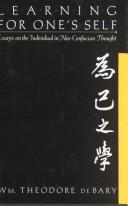
ISBN: 0231074263 9780231074261 Year: 1991 Publisher: New York (N.-Y.): Columbia university press,
Abstract | Keywords | Export | Availability | Bookmark
 Loading...
Loading...Choose an application
- Reference Manager
- EndNote
- RefWorks (Direct export to RefWorks)
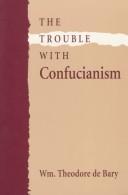
ISBN: 067491015X 0674910168 9780674910164 9780674910157 Year: 1996 Publisher: Cambridge (Mass.): Harvard university press,
Abstract | Keywords | Export | Availability | Bookmark
 Loading...
Loading...Choose an application
- Reference Manager
- EndNote
- RefWorks (Direct export to RefWorks)
S12/0400 --- S12/0430 --- Confucianism --- Neo-Confucianism --- Philosophy, Chinese --- Religions --- China: Philosophy and Classics--Kongzi 孔子 Confucius and Confucianism --- China: Philosophy and Classics--Neo-Confucianists: general and Song (including lixue 理學) --- Neo-Confucianism. --- Confucianism.
Book
ISBN: 023104870X 9780231048705 Year: 1980 Publisher: [Lieu de publication inconnu]: [éditeur inconnu],
Abstract | Keywords | Export | Availability | Bookmark
 Loading...
Loading...Choose an application
- Reference Manager
- EndNote
- RefWorks (Direct export to RefWorks)
Confucianists --- -Biography --- Lin, Chao-en --- China --- Religion --- S13A/0200 --- S13A/0905 --- S05/0213 --- S12/0400 --- S13A/0310 --- S13A/0401 --- -#SML: Joseph Spae --- Confucianism --- Philosophy, Confucian --- China: Religion--General works --- China: Religion--Interreligious dialogue:general --- China: Biographies and memoirs--Ming --- China: Philosophy and Classics--Kongzi 孔子 Confucius and Confucianism --- China: Religion--Buddhism: China --- China: Religion--Popular religion: Taoism --- Biography --- Religion. --- #SML: Joseph Spae --- Lin, Chao-en, --- Lin, Maoxun, --- Lin, Longjiang, --- Ziguzi, --- Sanjiaoxiansheng, --- Lin, Mao-hsün, --- Lin, Lung-chiang, --- Tzu-ku-tzu, --- San-chiao-hsien-sheng, --- 林兆恩, --- Confucianists - - Biography - China --- -Lin, Chao-en --- China - Religion
Book
ISBN: 8200022641 9788200022640 Year: 1972 Publisher: Oslo: Universitetsførlaget,
Abstract | Keywords | Export | Availability | Bookmark
 Loading...
Loading...Choose an application
- Reference Manager
- EndNote
- RefWorks (Direct export to RefWorks)
Philosophy, Chinese --- S12/0200 --- S12/0400 --- S12/0430 --- S12/0600 --- S13A/0320 --- #SML: Joseph Spae --- Chinese philosophy --- China: Philosophy and Classics--General works --- China: Philosophy and Classics--Kongzi 孔子 Confucius and Confucianism --- China: Philosophy and Classics--Neo-Confucianists: general and Song (including lixue 理學) --- China: Philosophy and Classics--Zhuangzi --- China: Religion--Chinese Buddhism: Chan Buddhism (incl. texts)
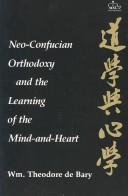
ISBN: 0231052286 9780231052283 Year: 1981 Publisher: New York: Columbia university press,
Abstract | Keywords | Export | Availability | Bookmark
 Loading...
Loading...Choose an application
- Reference Manager
- EndNote
- RefWorks (Direct export to RefWorks)
Neo-Confucianism. --- Neo-Confucianism --- Philosophy, Chinese. --- China --- Religion. --- S12/0430 --- S35/0900 --- -Philosophy, Chinese --- #SML: Joseph Spae --- Chinese philosophy --- Confucianism --- Philosophy, Chinese --- China: Philosophy and Classics--Neo-Confucianists: general and Song (including lixue 理學) --- Japan--Philosophy --- Neo-Confucianism - Japan. --- China - Religion.
Book
ISBN: 9781438442891 9781438442884 1438442882 1438442890 Year: 2012 Publisher: Albany: State university of New York press,
Abstract | Keywords | Export | Availability | Bookmark
 Loading...
Loading...Choose an application
- Reference Manager
- EndNote
- RefWorks (Direct export to RefWorks)
Providing a bracing expansion of horizons, this book displays the unsuspected range of human thinking on the most basic categories of experience. The way in which early Chinese thinkers approached concepts such as one and many, sameness and difference, self and other, and internal and external stand in stark contrast to the way parallel concepts entrenched in much of modern thinking developed in Greek and European thought. Brook Ziporyn traces the distinctive and surprising philosophical journeys found in the works of the formative Confucian and Daoist thinkers back to a prevailing set of assumptions that tends to see questions of identity, value, and knowledge--the subject matter of ontology, ethics, and epistemology in other traditions--as all ultimately relating to questions about coherence in one form or another. Mere awareness of how many different ways human beings can think and have thought about these categories is itself a game changer for our own attitudes toward what is thinkable for us. The actual inhabitation and mastery of these alternative modes of thinking is an even greater adventure in intellectual and experiential expansion.
Li. --- Philosophy, Chinese. --- Truth --- Coherence theory. --- Li --- Philosophy, Chinese --- Coherence theory of truth --- Chinese philosophy --- Confucian ethics --- Ethics --- Philosophy, Confucian --- Coherence theory --- S12/0217 --- S12/0430 --- China: Philosophy and Classics--Epistemology --- China: Philosophy and Classics--Neo-Confucianists: general and Song (including lixue 理學) --- Truth - Coherence theory.
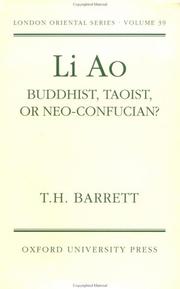
ISBN: 0197136095 9780197136096 Year: 1992 Volume: 39 Publisher: Oxford: Oxford university press,
Abstract | Keywords | Export | Availability | Bookmark
 Loading...
Loading...Choose an application
- Reference Manager
- EndNote
- RefWorks (Direct export to RefWorks)
"Neo-Confucianism, the state sponsored orthodoxy of China's later empires, is now recognised as an important key to understanding China. This study looks at the roots of Neo-Confucianism in an age when Buddhism and Taoism had eclipsed the Confucian tradition in importance. Li Ao (c. 772-836 A.D.), though generally acknowledged as the forerunner of Neo-Confucianism, is still regarded as deeply influenced by Buddhism. The historical reasons for the creation of this image of Li Ao are examined, prior to a close investigation of the actual circumstances which shaped his Fu-hsing shu, 'Book of Returning to One's True Nature', the essay which had the deepest influence on the development of early Neo-Confucianism. Although common assumptions about Buddhist influence on Li Ao are questioned, the true importance of the essay emerges in the typically Chinese patterns of thought which it exhibits and which gave it an impact transcending the immediate circumstance that prompted its writing."--Jacket.
Buddhism. --- Neo-Confucianism. --- Taoism. --- Li, Ao, --- Philosophy. --- Religion. --- Buddhism --- Neo-Confucianism --- Taoism --- S12/0230 --- S12/0430 --- S13A/0310 --- Daoism --- Taouism --- Religions --- Tao --- Confucianism --- Philosophy, Chinese --- Buddha and Buddhism --- Lamaism --- Ris-med (Lamaism) --- China: Philosophy and Classics--Chinese philosophy: Sui and Tang --- China: Philosophy and Classics--Neo-Confucianists: general and Song (including lixue 理學) --- China: Religion--Buddhism: China --- Li, Wen gong, --- Ri, Kō, --- Li, Wen kung, --- Ri, Bun-kō, --- 李翱, --- 李翺,
Book
ISBN: 0691068321 1322019487 9781400861989 1400861985 9780691601724 0691601720 9780691068329 0691631360 Year: 1991 Publisher: Princeton: Princeton university press,
Abstract | Keywords | Export | Availability | Bookmark
 Loading...
Loading...Choose an application
- Reference Manager
- EndNote
- RefWorks (Direct export to RefWorks)
In this major contribution to the study of the Chinese classics and comparative religion, John Henderson uses the history of exegesis to illuminate mental patterns that have universal and perennial significance for intellectual history. Henderson relates the Confucian commentarial tradition to other primary exegetical traditions, particularly the Homeric tradition, Vedanta, rabbinic Judaism, ancient and medieval Christian biblical exegesis, and Qur'anic exegesis. In making such comparisons, he discusses some basic assumptions common to all these traditions--such as that the classics or scriptures are comprehensive or that they contain all significant knowledge or truth and analyzes the strategies deployed to support these presuppositions. As shown here, primary differences among commentarial or exegetical traditions arose from variations in their emphasis on one or another of these assumptions and strategies. Henderson demonstrates that exegetical modes of thought were far from arcane: they dominated the post-classical/premodern intellectual world. Some have persisted or re-emerged in modern times, particularly in ideologies such as Marxism. Written in an engaging and accessible style, Scripture, Canon, and Commentary is not only a challenging interpretation of comparative scriptural traditions but also an excellent introduction to the study of the Confucian classics.Originally published in 1991.The Princeton Legacy Library uses the latest print-on-demand technology to again make available previously out-of-print books from the distinguished backlist of Princeton University Press. These editions preserve the original texts of these important books while presenting them in durable paperback and hardcover editions. The goal of the Princeton Legacy Library is to vastly increase access to the rich scholarly heritage found in the thousands of books published by Princeton University Press since its founding in 1905.
Chinese classics --- Philosophy, Confucian --- Languages & Literatures --- East Asian Languages & Literatures --- Confucian philosophy --- Confucianism --- Philosophy, Chinese --- History and criticism --- Philosophy, Confucian. --- History and criticism. --- S12/0300 --- S12/0400 --- S12/0430 --- China: Philosophy and Classics--Confucian classics --- China: Philosophy and Classics--Kongzi 孔子 Confucius and Confucianism --- China: Philosophy and Classics--Neo-Confucianists: general and Song (including lixue 理學) --- Chinese classics -- History and criticism. --- Chinese classics - History and criticism.
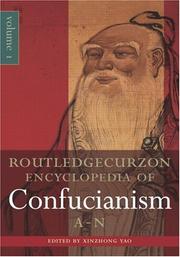
ISBN: 0700711996 0415306523 0415306531 9780415306539 9780700711994 9780415306522 Year: 2003 Volume: 1 Publisher: London: Routledge,
Abstract | Keywords | Export | Availability | Bookmark
 Loading...
Loading...Choose an application
- Reference Manager
- EndNote
- RefWorks (Direct export to RefWorks)
This unique reference covers Confucianism as a whole, in 1235 entries on its history, doctrines, schools, rituals, sacred places and terminology, and on the new thinking taking place in China and other Eastern Asian countries. Written by an international team of specialists, it provides extensive textual cross-references, bibliographies, and three comprehensive indexes. Entries include: * Altar to the Sun * Benran zhixing (Original human nature) * Boshi (Erudites or Academicians) * Cheng Duanmeng (1143-1191) * Chijing (Holding or maintaining seriousness) * Ching, Julia (1934-2001) * Chuanxi Lu ('Instructions for Practical Living') * Confucianism and Capitalism * Confucianism and Christianity * Dade xiaode (Great virtue and petty virtue) * Da zhangfu (Great man) * E (Evil, disagreeable, to dislike) * Fan Zhen, (1008-89; 'zi' Jingren) * Fufu (Husband and wife) * Gong (Acting for public interests) * He Lin (1902-1992, 'zi' Zizhao) * Jiaohua (To educate and transform) * Kaitokud (the Merchant Academy of Osaka) * Kojiki ('Records of Ancient Matters') * Liangxin (the good or innate mind) * Luan (Disorder, chaos) * Min (The people, the masses) * Neisheng waiwang (Sageliness within, kingliness without) * Ping tianxia (Making the world peaceful) * Qi qing (Seven emotions) * Renlun (Human relationships) * Rites of Passage * Rujia bapai (The eight Confucian factions) * Sang li (Rites of mourning and burial) * Se (Countenance, sensual beauty) * Tianxia (The World) * Wu Jing (The Five Classics) * Xian sheng (the First Sage) * Yan Zhitui (531-591, 'zi' Jie) * Zhangyou (Senior-junior relationship) * And many more.
Comparative religion --- Philosophy --- Confucianism --- Confucianists --- Confucianisme --- Confucéens --- Encyclopedias --- Biography --- Dictionaries --- Encyclopédies --- Biographie --- Dictionnaires anglais --- S12/0400 --- S12/0100 --- 299.512 --- Religions --- China: Philosophy and Classics--Kongzi 孔子 Confucius and Confucianism --- China: Philosophy and Classics--Bibliographies, dictionaries, yearbooks and collections --- Confucianisme. Mencius. I Ching --- J1440 --- J1006 --- K9040 --- K9031.60 --- 299.512 Confucianisme. Mencius. I Ching --- Japan: Philosophy -- Confucianism --- Japan: Philosophy -- Reference works --- Korea: Philosophy and thought -- schools -- Confucianism --- Korea: Philosophy and thought --Reference works --- Confucéens --- Encyclopédies --- Confucianism - Encyclopedias. --- Korea: Philosophy and thought -- reference works --- encyclopedia --- Encyclopedias.
Book
ISBN: 089264057X 0892640588 9780892640584 9780892640577 Year: 1985 Volume: 52 Publisher: Ann Arbor: University of Michigan. Center for Chinese studies,
Abstract | Keywords | Export | Availability | Bookmark
 Loading...
Loading...Choose an application
- Reference Manager
- EndNote
- RefWorks (Direct export to RefWorks)
Holism --- Individualism --- Philosophy, Confucian --- Taoist philosophy --- Individualisme --- Philosophie confucéenne --- Philosophie taoïste --- Congresses --- Congrès --- S02/0200 --- S12/0400 --- S12/0210 --- S12/0430 --- S12/0500 --- S16/0170 --- #SML: Joseph Spae --- China: General works--Civilization and culture --- China: Philosophy and Classics--Kongzi 孔子 Confucius and Confucianism --- China: Philosophy and Classics--Special philosophical subjects --- China: Philosophy and Classics--Neo-Confucianists: general and Song (including lixue 理學) --- China: Philosophy and Classics--Laozi and Taoism (incl. Daodejing) --- China: Literature and theatrical art--General works on modern literature --- Philosophie confucéenne --- Philosophie taoïste --- Congrès --- Philosophy, Taoist --- Philosophy --- Wholism --- Evolution --- Whole and parts (Philosophy) --- Individualism - Congresses --- Holism - Congresses --- Philosophy, Confucian - Congresses --- Taoist philosophy - Congresses
| Listing 1 - 10 of 13 | << page >> |
Sort by
|

 Search
Search Feedback
Feedback About UniCat
About UniCat  Help
Help News
News